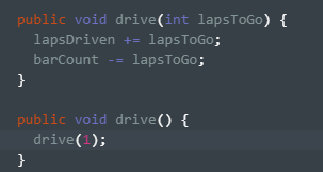Welcome to the Treehouse Community
Want to collaborate on code errors? Have bugs you need feedback on? Looking for an extra set of eyes on your latest project? Get support with fellow developers, designers, and programmers of all backgrounds and skill levels here with the Treehouse Community! While you're at it, check out some resources Treehouse students have shared here.
Looking to learn something new?
Treehouse offers a seven day free trial for new students. Get access to thousands of hours of content and join thousands of Treehouse students and alumni in the community today.
Start your free trial
Lauritz Soe
537 PointsDrive method
I can't seem to figure this step out. Anyone out there able to explain?
class GoKart {
public static final int MAX_BARS = 8;
private String color;
private int barCount;
private int lapsDriven;
public GoKart(String color) {
this.color = color;
}
public String getColor() {
return color;
}
public void charge() {
barCount = MAX_BARS;
}
public boolean isBatteryEmpty() {
return barCount == 0;
}
public boolean isFullyCharged() {
return MAX_BARS == barCount;
}
public int drive() {
lapsDriven++;
barCount--;
}
}
1 Answer
Rares Conea
Courses Plus Student 15,000 PointsHi Lauritz,
At step 1 you must modify the existing drive method by defining it to accept a parameter of type int which you must add to lapsDriven and decrease from barCount. At step 2 just overload the drive function by defining a new one which does not accept any parameter and the only thing it is doing is to call the drive method that accepts a parameter with the value 1 as parameter.
